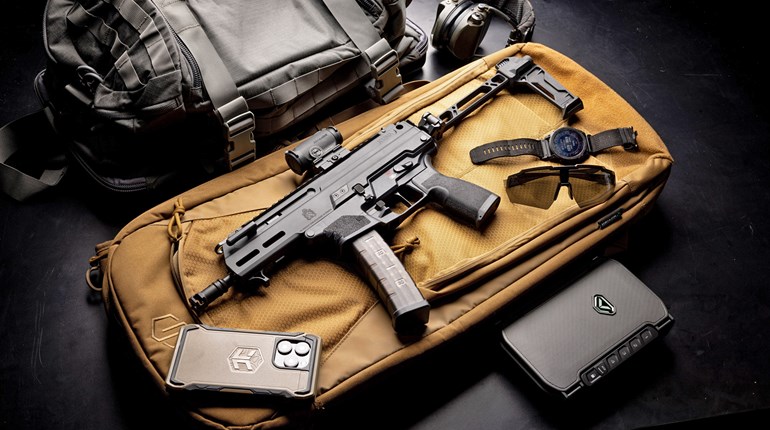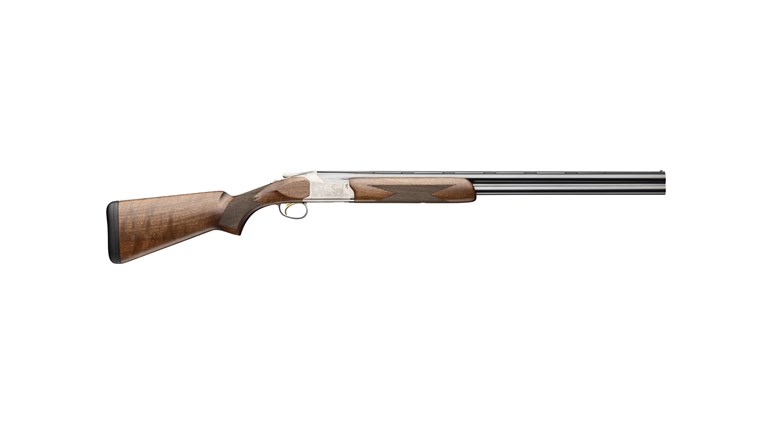

Back when I had a serious job, seeing targets in any lighting condition was critical to having a good day. While thermal and night-vision optics took care of the job outdoors, dealing with indoor threats was normally best handled with white light. Of all the items attached to my Army-issued guns, a weapon mounted light was the most important. I could make do without just about any other accessory in the close-range situations I often faced, but an inability to identify and discriminate between good and bad targets simply meant failure.
An unfortunate byproduct of the times is that today's home-defense firearm needs are not too dissimilar from those of our troops. Identifying all manner of hazards—from home intruders to predators snacking on family pets—is an ever-present reality in our world. Tritium night sights are great for aiding sight alignment in the dark, but you have to find and identify your target first; glowing sights will not help you do that. Assuming you have not lost power, turning on the house lights will help you, but they will also help an intruder. Holding a flashlight by hand alongside a firearm will work in a pinch, but it commits your support hand to a different job. By contrast, the weaponlight allows normal use of both hands and can decidedly tip the scales in your favor when the chips are down.
"Picatinny rail" has not always been synonymous with tactical arms. Before Sept. 11, I was in one of the only military units that used gun lights. We employed electrical tape, hose clamps, flex ties, bolted on Weaver rails and scope rings to fasten all sorts of commercial lights to our guns.

Weapon Mounted Light Popularity
Today it is more common to find tactical arms with mounting rails than without. Likewise, several companies offer tactical lights intended specifically for gun mounting. SureFire is the recognized leader of the pack, making solid products that are pricey, but effective. Insight Technology leverages its growing military and law enforcement support experience into a variety of good illumination products. Streamlight is a late-comer to this game, but its product line includes several affordable, well-made gun lights.
When considering the bargain-priced lights currently flooding the market, beware—many won't hold up to shock and recoil. Traditional bulbs that use filaments don't like to be roughed up when illuminated. The aforementioned companies develop products that can handle the forces imparted by harsh use without missing a beat. If your budget forces you to settle for a cheap gun light, test it thoroughly on your firearm before relying on it to protect your life.
Bulb type and power source determine a light's output (intensity measured in lumens) and efficiency (burn time measured in hours). Bulbs that use a filament, charged gas, or a combination of the two—commonly grouped into the incandescent category—tend to be much brighter and project farther. However, they're also more fragile and consume batteries faster than a house full of kids with handheld video games. LED lamps are a longer-lasting solution made up of semiconductor chips encased in clear protective materials. They're durable, just sip battery power and don't burn out, but produce less visible light.
Recent advances in LED technology, however, have yielded significant improvements, including infrared (IR) LED lights for use with night-vision equipment. The CR123, 3-volt lithium battery has become the industry-standard power source for most full-size lights and other accessories. Though more expensive than traditional alkaline batteries, these little powerhouses help provide the intense light needed in a potentially lethal encounter and are becoming more common in stores.

Positioning the light forward on a rifle or shotgun handguard keeps it free and clear of the support hand while limiting the amount of barrel illuminated. Mounting on the opposite side of the body as the long gun is carried—right side of gun for a right-handed shooter—keeps the light from getting tangled with gear. The downside is any movement through vegetation will snag the light relentlessly. I always choose to keep my rifles slick when in the woods, which also reduces chances of a white-light compromise. Quick-detachable (QD) light mounts are useful in this situation, providing a means to quickly attach the light when transitioning to an environment where it will be needed.
Options For Pistols, Rifles and Shotguns
Like most tactical long arms, many modern large-frame semi-automatic handguns include short rail sections that allow handgun-specific lights to be mounted. The smallest rail-equipped pistols normally require specially designed micro lights, such as the Insight X2 (which you might know as the Springfield Armory XML). Unfortunately, revolver shooters have few options for gun light mounts. While some revolvers' ejector shrouds are beefy enough to facilitate permanent rail attachment, this is a modification best performed by a qualified gunsmith. Beamshot makes an inexpensive universal rail (UT1) that attaches to a handgun's trigger guard. While not robust or even ergonomic, it is an option for the nightstand revolver performing primary home-defense duty.
Switch options are varied and highly customizable to shooter needs. Tail-cap buttons, rocker switches, tape-switches and rail-mounted pressure buttons allow momentary and/or constant-on settings. SureFire has gone to a standard "XM00" tail-cap that works on several light bodies. It has a self-contained button that also accepts a plug-in remote switch. The only thing left for the shooter to decide is which length of cable to buy and where to mount the switch. Remember to unscrew the tailcap or open the battery compartment on any light that is being packed in a range bag or gun case. The same pressure that holds your firearm in place during transit will inevitably activate gun light switches too, burning out expensive xenon bulbs and expending your batteries.

Using a gun light effectively isn't as simple as installing the batteries, mounting it and then storing your gun until it is needed. Test the system in limited or no light to get a feel for its strengths and limitations. Learn how to manage your light switches while under stress or duress during the integrated act of firing. Remember, the same light illuminating your target also highlights your location rather nicely. Momentary switches allow a quick look without the constant burn that makes you an easy mark. I strongly recommend professional training courses that include work with a weapon mounted light. The techniques you develop while shooting paper targets at dusk don't necessarily translate well to a dark room when that bump in the night turns out to be someone pointing a gun at you.
When used correctly, a weapon mounted light can aid target discrimination, temporarily ruin a threat's eyesight and provide the momentary advantage needed to take control of a potentially bad situation. Any home-defense rifle, shotgun or pistol can benefit from one in the hands of a trained shooter.




































